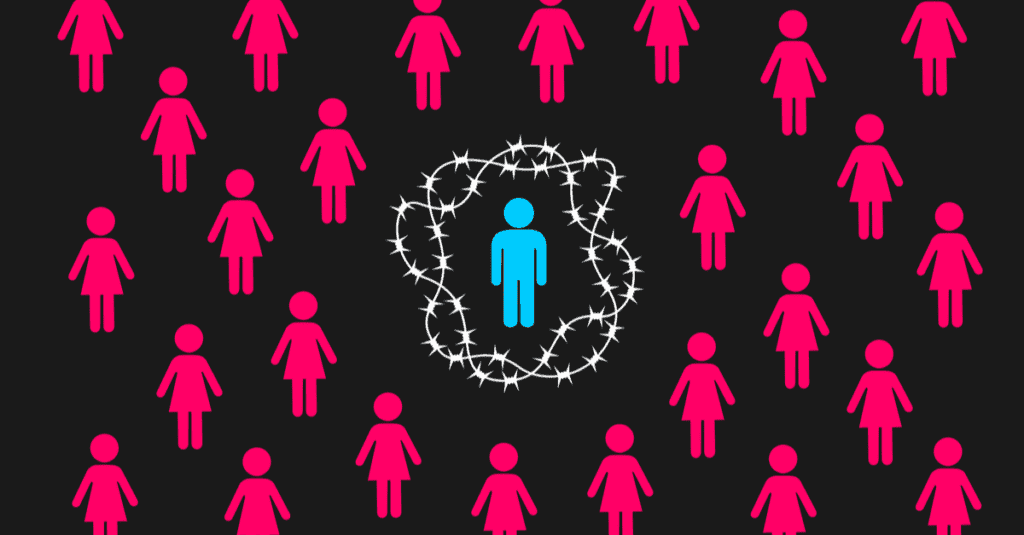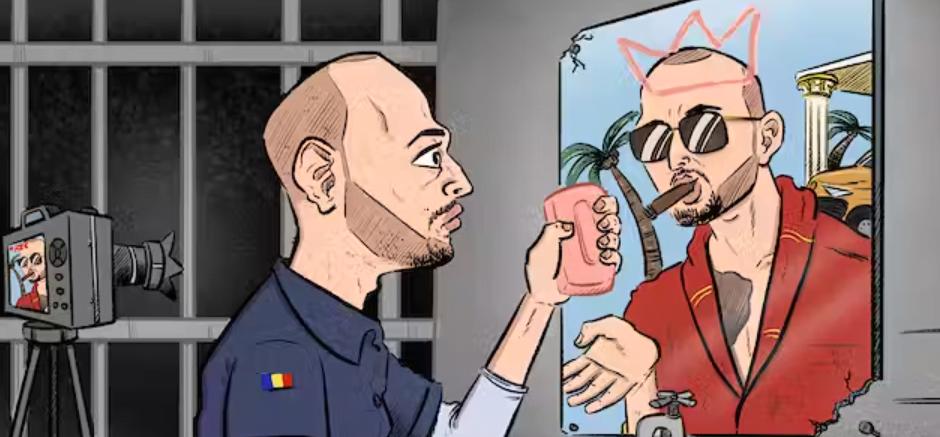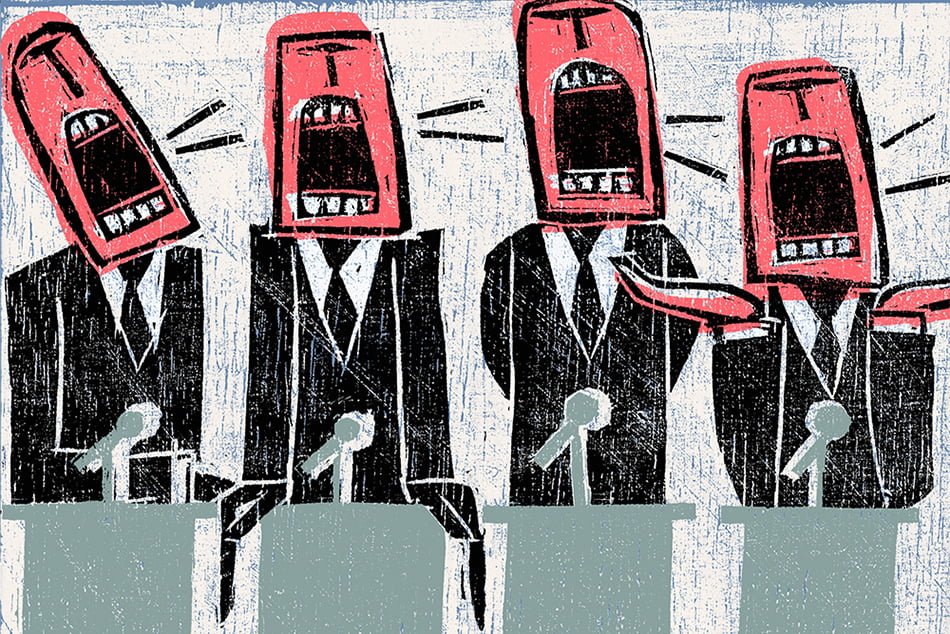Lately, there has been a surge of content across social media platforms that aims to encourage men to groom better, focus on building a fitter body, to “grind” for a successful future. These contents talk about hypermasculine men whose value is defined by wealth, confidence, influence and sexual dominance over women. Even though such content has garnered ‘likes,’ many social media users have found them misogynistic, promoting toxic masculinity and hatred towards women.
Lucina Di Meco, in “Monetizing Misogyny: Gendered Disinformation and the Undermining of Women’s Rights and Democracy Globally” recognises that social media has been designed in a way that women’s experiences online are worsened. She writes that “Harmful narratives are boosted and amplified through algorithms that make such content sticky and often viral, through recommender systems that are built to maximize attention and features that facilitate its rapid and widespread distribution.”
Andrew Tate, former kickboxer and self-proclaimed misogynist, is one such personality who blatantly propagates dangerous and misogynistic content. Tate has been banned from Facebook, Instagram, TikTok and YouTube due to his problematic views on women. Tate believes in traditional masculine values which according to him are having “fast cars and a big house and a lot of money and a beautiful girlfriend” as he said in a preview of “Tucker Carlson Today” on Fox Nation.
In 2023, he was charged on account of human trafficking, rape and the creation of a crime group to sexually assault women. Despite infamy, Tate has gained a reputation among young men.
Professor Prem Kumar Vijayan, who teaches English Literature at the Hindu College, DU and has extensively worked on masculinity and violence says to FII, ‘It is interesting that Andrew Tate claims to have a million Indians joining his Hustlers University to get his Andrew Tate Course Bundle (cf. YouTube). The ideas he sells appeal globally because they offer gendered pathways to success in a globalised, technology-based, capitalist world. They serve to promote men, exclude women, and celebrate ideas of dominance and servility. This seems to be particularly attractive to the young Indian male, looking to become “successful” and “powerful,” quickly and with little effort.’
He further mentions, ‘Tate also promotes cultivating a strong individualist personality, that is willing and able to break conventions, even laws, to achieve his end. The ‘heroic’ aspect of such investment in the individual can be profoundly appealing.’

Closer home we are not much behind the race when it comes to creating such content.
A content creator named Ayush Raibhatt who goes by the name ChadTag on Youtube has his account flooded with videos aimed to help teenage boys and young adult men to improve themselves, some of which are to attract women. The videos are about improving looks to “increase your sexual market as a teenager.” His advice to men includes not to be “too” emotional. He advises his audience to focus on “achhi ladki” (good women) ones who are virgins or a woman with less than two body counts.
Sarthak Goel, who addresses himself as a men’s personality coach, asks men to put aside emotions and think logically. According to him, if a man looks for love and care in a relationship he is allowing his feminine side to take control. The root of reclaiming one’s masculinity is by having sex with beautiful women, he says. Goel praises the traditional society. But due to changing times “Girls nowadays have experience before marriage. And, thus, after marriage, they tend to lead. Men become stupid because he does not have any idea as to how to control women,” he often remarks in in his content.
A YouTube content creator, Mayank Bhattacharya, motivates men to hustle more, groom better and look good. In one of his videos that he made for the singles and the sexless, he describes men as “products” in the “dating market” and guides them to stand out as a product. He encourages men to let loose of their “mann nahi kar raha” mentality because that’s not what a man does. That would lead to a man being “single, sexless and a virgin all your life.”
When reached out for comments, none of the influencers responded. Combined, these three creators have around 659k subscribers. The consumers of their media are quite high and are often seen showering them with heaps of praise. One of the comments on Goel’s video on YouTube reads “You’re a very good man who’s helping us become a masculine and real man.”
Professor Vijayan says that social media amplifies the voices of individuals. Picking up on ‘already dominant forms of masculinity found in patriarchies, they draw especially those men who feel disempowered, in different ways and to varying degrees – whether physically, financially, socially or sexually.’
Commenting on the criteria set by influencers as markers of masculinity that attract women he says, ‘These toxic influencers insist that ideals of masculinity that promote mutuality, respect and equitable relations between men and women, are not self-improvement, but harmful for men, and their self-esteem because they are seen as “weak” forms of masculinity. Such understandings promote financial, physical and mental strength and prowess, as the most masculine markers of power and success. In its extreme forms, this enhances the potential for violence, especially towards women, as an immediate and effective means for exercising control.’
Many people also disagree with these influencers and raise other concerns.
Aditya Keshari, a final-year engineering student at Netaji Subhas University of Technology comments that a lot of men are disillusioned by the current societal structures and the pressures that come with them.
‘They do not have significant prospects of improving their quality of life. Yet societal expectations of masculinity are to be an earner, be self-sufficient, be strong, be independent and rich. These influencers sell them this way of life that they promise will fulfil their dreams, change their lives, and make them attractive and rich. They promise these traditional masculine qualities will make them desirable. They feed on the inherent insecurities and loneliness that is rampant in men,’ says Aditya.

Chadtag has a webpage that is dedicated to changing the way one looks since “personality is the outcome of your looks” which attracts more respect and partners. The module charges $20. Mayank Bhattacharya too has his own business of slim-fit t-shirts, hair pastes and shoes that he promoted in his video.
Aditya believes that such influencers dehumanise women. They blame the pressures of patriarchal structure on women and in turn, reinforce them by the things they promote.
Dhruvi Goswami, a twenty-one-year-old student expresses her hopelessness and dismay on the issue. ‘Dating should be a natural process. Not something one should be on the hunt for. Such influence is very predatory,’ she said.
‘They treat every woman as an object that can be acquired. This gives a lot of entitlement to men. They completely ignore the fact that women also have agency and consent to say no. and the moment a woman would say ‘no’, they would somehow consider themselves victims,’ comments Titas Goswami another student from Dr. B.R. Ambedkar University Delhi.

On possible solutions, Professor Vijayan suggests, ‘alternative conceptions of masculinity, that can delink it from narrow conceptions of power and success, emphasising respect – for women in particular, but also self-respect – and mutuality, rather than dominance and control, and even representing these as aesthetic in their own right, must emerge and be promoted, especially within the social media environment, but also outside it.’
He suggests that the task is to establish social respect and esteem in different ways, not founded on power. ‘Longer term solutions have to focus, not only on the medium, but on the power- systems that it is embedded in, and which it is shaped by. Unless those inequalities of power are not addressed, the association of masculinity with power will persist.’





